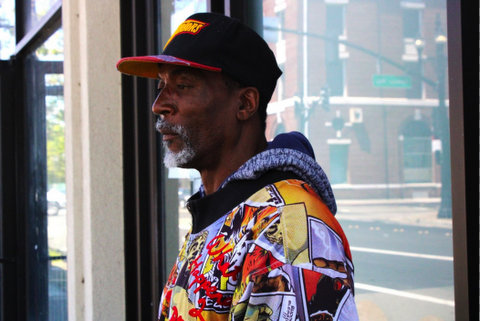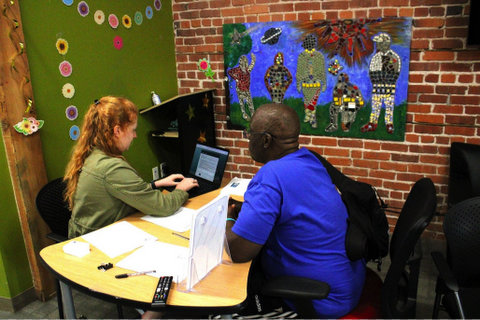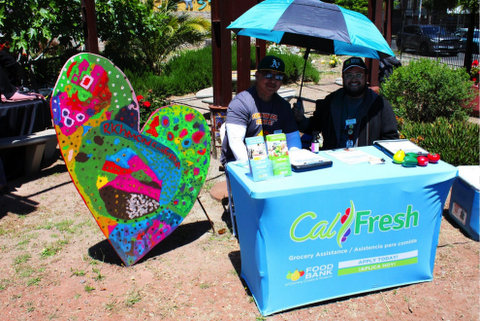
22 May ‘Each of Us Is More Than the Worst Thing We’ve Ever Done’: Clean Slate Day Helps People Overcome Their Mistakes

Leonard Fussell said three of his front teeth were knocked out by police officers who beat him.
Story and photos by Joe Porrello
Leonard Fussell grew up in Oakland as a straight-A student, skipping multiple grades. Then, in 1990, at 17, his life changed. That’s when he went to prison for the first time. He’s been in and out of the justice system ever since, a victim of gun violence along the way.
His life changed again one day when he went to get a bus pass.
Indeed, in 2018, Fussell initially joined the Contra Costa County Public Defenders’ Office Clean Slate Program — which helps formerly incarcerated people reintegrate into society — just to get free public transportation. He was hesitant to commit to the program.
“I didn’t feel like I needed it,” he said.
But he did commit, and it helped him get his criminal records sealed later that year. Then, he wanted them expunged.
“I didn’t like that I actually did my time, but I still had to be monitored,” said Fussell.
When his expungement was denied, he says he lost hope.
“I gave up, but Clean Slate didn’t give up on me,” Fussell said.
In November 2023, a lawyer in the Clean Slate Unit emailed, asking if he wanted to appeal his expungement denial. He did.
He was pardoned by Gov. Gavin Newsom in February before finally having his record expunged last month.
“Because I had my record expunged, now I can get blind services,” Fussell said. “I can vote. I can get back to normal things.”
Also helping him get back to normal things is the Richmond Reentry Success Center, which offers free family and legal services; assistance with rehabilitation, medical coverage, education, financial planning, housing, employment and public benefits; as well as support groups.
- Many new potential members spoke with reentry coaches about joining the program during Clean Slate Day in Richmond.
Fussell has twice completed the center’s nine-week Alpha Program, which he says is about self-reflection, taking responsibility and considering risks, as well as how one’s actions impact their community.
“The alpha group helps me work on the issues I have from being impacted by prison, the anxiousness and the jumpiness from the things I was subjected to,” said Fussell. Seeing other former inmates excelling in the programs or even working for the groups, he says, motivates him and gives him role models to emulate.
The Reentry Center and Public Defender’s Office co-hosted Clean Slate Day on Friday in Richmond. The gathering has been happening for over five years and pools together community organizations offering additional resources for a fresh start.
- Different community organizations gathered across from the Reentry Success Center at The Heart of Richmond Park, where attendees browsed different resources and support available.
The event comes amidst a 30% unemployment rate among formerly incarcerated people, according to NBC News.
“The main issue we see holding people back is employment,” said assistant public defender and Clean Slate Unit leader Jermel Thomas, pointing to background checks as the underlying problem. Usually far into the hiring process, potential employees who would have likely otherwise been hired are denied a job because of their past mistakes.
“Each of us is more than the worst thing we’ve ever done,” said Thomas.
Clean Slate also provides free meetings with attorneys and support regarding rap sheets, eligibility determination, personal statements, and early probation termination.
The point of granting clean slates to those with criminal records, Thomas noted, is to avoid high rates of recidivism that accompany unemployment.
And the adversity does not end in the workforce.
“There’s so many things that block them out; they’re definitely marginalized when it comes to accessing vital services,” said Reentry Success Center site manager Tiffany Anaya. “It can be really challenging to contribute to our society or avoid recidivism if you don’t have the same opportunity as everyone else.”
- Upon entering the Reentry Success Center in Richmond, attendees of Clean Slate Day were greeted with a colorful mural on the wall of the lobby.
The RSC holds office hours for outside partners throughout the week to make sure members uncomfortable asking for help are seen where they have already developed a safe space.
“It’s all here, so we don’t have to send them all over,” Anaya said.
Open six days a week, the center has five reentry coaches who offer service coordination and immediate stability to individuals returning from local detention facilities, state prisons, treatment facilities, “or even just off the streets,” said Anaya.
“Our reentry coaches really provide a mediator, holding our partners accountable to our members because any of our referrals we make, we ensure our members are receiving the services they opted into,” she said.
Donnie Diego, a graduate of the Alpha Program and a certified peer support specialist and registered drug and alcohol counselor, said the adversity he faced due to his incarceration was unmanageable alone. He got into the field of healing to pay forward the help he received.
“They say in recovery that you can’t keep it unless you give it away… I got the tools from places like this to do further work,” he said. “If it wasn’t for the resources available to me back then, I don’t know if I would have made it.”
Once facing 30 years in prison, Diego said the programs drastically changed his life.
“I used to be a really big drug dealer, and prior to this, I was actually the floor manager of a major strip club in San Francisco,” he said. “If you were to tell me I’d be in the industry of helping people… I would have laughed.”
What keeps him in the line of work is seeing people he assisted whose “spirits are no longer broken.”
“That light at the end of the tunnel is no longer a train coming toward them; it’s a way out,” he said.
- A piece of art seen in the lobby of the Reentry Success Center in Richmond.
Diego pointed to more mental health outreach being needed.
“If you’re stuck in that mentality, you might feel like you lack ability and have insecurity about doing something different,” he said.
Both Diego and Fussell said those with criminal records are often victims of their environment.
“They didn’t just wake up one morning and decide they want to rob a bank; it’s the upbringing, the neighborhood, how you were raised,” said Fussell.
The pair also agreed that the problem can be minimized by parole officers more frequently letting people know what help is available.
Anaya says business owners and hiring managers need to be more accommodating, and more community-based stakeholders and organizations need to get involved with the cause.
With some people unaware of RSC services, she wants to get the word out about the program.
CSP and RSC will host their Welcome Home Block Party Reentry Community Resource and Employment Fair on July 20 in Richmond.










No Comments